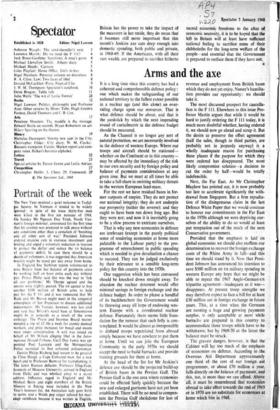Arms and the axe
It is a long time since this country has had a coherent and comprehensible defence policy : one which makes the safeguarding of our national territory to the fullest extent possible in a nuclear age (and this alone) an over- riding charge upon our resources. That is what defence should be about, and that is the yardstick by which the next impending round of curtailments in the defence budget should be measured.
As the Channel is no longer any sort of natural protection, we are necessarily involved in.the defence of western Europe. Where our troops and aircraft should be stationed= wbether on the Continent or in this country— may be affected by the immediacy of the risk to our own security and by foreign policy and balance of payments considerations at any given time. But we must at all times be able to take a full share in resisting military threats to the western European land-mass.
For the rest we have residual bases in for- mer outposts of empire. They do not protect our national integrity; they do not underpin our prosperity (rather the reverse); and they ought to have been run down long ago. But they were not; and now it is inevitably going to be a slow process to extricate ourselves.
That is■ why any new economies in defence are irrelevant (except in the purely political sense of rendering economies at home more palatable to the Labour party) to the pro- gramme of retrenchment in public spending which is needed to give devaluation a chance to succeed. They can be judged exclusively by their relevance to a sensible long-term policy for this country into the 1970s.
One suggestion which has been canvassed should be knocked down straight away. To abandon the nuclear deterrent would offer minimal savings in foreign exchange and the defence budget. In order to please a handful of its backbenchers the Government would be throwing away all hope of endowing wes- tern Europe with a coordinated nuclear defence. Fortunately there seems little foun- dation for the rumour that such folly is con- templated. It would be almost as irresponsible to disband troops repatriated, from abroad simply because we have nowhere to put them at home. Until we can join the European Community in the early 1970s we should accept the need to build barracks and provide training grounds for them at home.
At the head of the list for Mr Jenkins's defence axe should be the projected build-up of British bases in the Persian Gulf. The Persian Gulf is the one area where economies could be effected fairly quickly because the new and enlarged garrisons have not yet been established. There will be no need to compen- sate the Persian Gulf sheikdoms for loss of revenue and employment from British bases which they do not yet enjoy. Nasser's humilia- tion provides our opportunity : we should take it.
The most discussed prospect for cancella- tion is the F 111. Elsewhere in this issue Pro- fessor Martin argues that while it would be hard to justify ordering the F 111 today, it is much more doubtful whether, having ordered it, we should now go ahead and scrap it. But the desire to preserve the offset agreement (half the sales, though to third parties, are probably not in jeopardy anyway) is a wholly inadequate reason for purchasing these planes if the purpose for which they were ordered has disappeared. The most likely compromise- solution—a decision to cut the order by half—would be totally indefensible.
Next, the Far East. As Mr Christopher Mayhew has pointed out, it is now probably too late to accelerate significantly the with- drawal from Singapore. But a firm repudia- tion of the disingenuous claim in the last Defence White Paper that we would continue to honour our commitments in the Far East in the 1970s although we were depriving our- selves of the ability to do so would at least put temptation out of the reach of the next Conservative government.
Provided that the emphasis is laid on global economies we should also reaffirm our determination to recover the foreign exchange costs of the Rhine Army in full—and this time we should stand by it. Now that Presi- dent Johnson has announced his intention to save $500 million on us military spending in western Europe any hope that we might be able to repeat the 1967 Anglo-German-us tripartite agreement—inadequate as it was— disappears. At present troop strengths we may therefore expect to face a bill for at least £30 million net in foreign exchange in future years. This, at a time when, the Germans are running a huge and growing payments surplus, is only acceptable at most while barracks are prepared in this country to accommodate those troops which have to be withdrawn; but by 1969-70 at the latest the balance must be struck.
The gravest danger, however, is that the Cabinet will lay too much of the emphasis of economies on defence. According to the Overseas Aid Department approximately one third of the cost of our foreign aid programmes, or about £70 million a year, falls directly on the balance of payments, and this, too, is more than we can afford. Above all, it must be remembered that economies abroad to take effect towards the end of 1969 or in 1970 are no substitute for economies at home which bite in 1968.


































 Previous page
Previous page